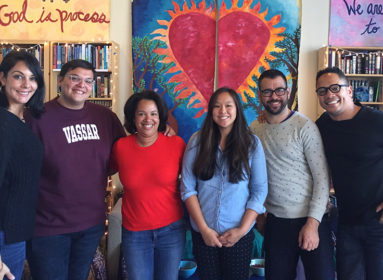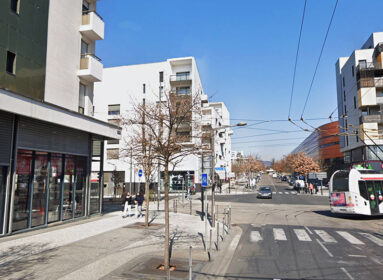
By Cindy Mindell
MADISON – If attendance is a mark of success for a summer camp, Laurelwood can boast a deep bench in a unique way.
Incorporated in 1937, the wooded property on the aptly-named Summer Hill Road in Madison is the only Jewish overnight camp in the state. And since its opening nearly 80 years ago, the facility has welcomed second- and third-generation descendants from some of the original campers. Director Ruth Ann Ornstein, who has headed the camp since 2003, estimates that at least 25 percent of current campers carry a multi-generational Laurelwood pedigree.
Orange native and Colchester resident Lori Goldstein is a good example. Her parents, Sidney and Elinor Shanbrom, were both at Laurelwood in the early ‘50s; Sidney as a camper from 1947 to 1951 and a waiter in 1951, Elinor as a camper from 1950 to 1953. They met again later and married, both serving on the camp’s board directors, where Sidney is a past president.
Lori attended Laurelwood from 1973 to 1979. “As a camper my first year, I was seven years old and was signed up for four weeks,” she says. “I remember writing home and saying that I wasn’t coming home; I was staying for the full eight weeks and they were welcome to come visit on visiting day. From that year back in 1973 all the way until 2000, I was at camp for the entire eight weeks.”
Lori progressed through the staff ranks, becoming a C.I.T. in 1982, a counselor from 1983 to 1985, division head from 1986 to 1987, girls’ head counselor from 1988 to 1997, and office staff member from 1998 to 2000. From 1995 to 2000, she was accompanied by her daughter, Andrea, from age nine months to five years. In 2002, Andrea became a camper, until 2008. Lori’s younger daughter, Hillary, was a camper from 2007 to 2013 and a junior counselor in 2014, and will return next summer as a counselor.
“We got involved because of tradition,” Goldstein says. “I don’t think it was ever questioned that we would go to camp; it was just what we did. We signed up and went.”
The family agrees that staff and friends are what make Laurelwood special. “Many of us have lifelong friends that were made at camp,” Lori says. “Hillary has a group of girls that have been together since the day they started at camp. They have had the same counselors for much of that time. There are not many staff members that, as parents, we would all trust to take a group of 30 teenagers to Costa Rica for three weeks, but after the years together, these staff members have become family to everyone. My daughters even refer to one as their ‘summer mom.’”
Laurelwood is also a place that can take credit for many weddings. Leslie Friedman of Easton and David Kramer of Fairfield met at camp in the ‘70s and married 20 years later and eventually settled in Ridgefield. David’s father, West Hartford native Barry Kramer, was a Laurelwood camper and waiter from 1946 to 1956. Now, the third generation of Kramers is represented on the camp roster: Caroline, 17, was a camper until this year; Jennifer, 15, is still a camper; and Allison, 11, started camp at age 5, perhaps Laurelwood’s youngest-ever participant.
“It’s a great all-around camp and there’s a comfort level being with other Jewish kids,” Friedman says. “My daughters describe the experience as, ‘It feels like you’re with family as soon as you walk through the entrance.’ From my experience and David’s, we knew we would have lifelong friendships and we do still maintain them. We knew that would continue for our kids because the bonds that we form there aren’t like any other connections.”
Those friendships also reflect the multi-generational character of Laurelwood: The couple’s daughters are friends with the children of her fellow campers from the ‘70s. And, some of the bunks still have notes that Leslie and her friends wrote on the walls.
For David Papermaster, what began with one summer in the early ‘70s as camp physician evolved into a three-generation Laurelwood legacy. The Woodbridge resident brought along his wife and two kids, Dan and Ellen. Last summer, Ellen’s seven-year-old son, Dylan, attended the Taste of Laurelwood weekend.
Dan Papermaster was a camper during the ‘70s and a staffer in the late ‘70s and early ‘80s, working as a waiter, cook, maintenance man, and counselor.
Both David and Dan have served on the Laurelwood board.
“As an adult, I stayed involved with camp because it is a truly special place where I made great friends and where we had great experiences,” Dan Papermaster says. “I realized that there are a lot of great and unique things about camp; two things stand out: As the only Jewish overnight camp in Connecticut, it is a true statewide community asset. And, it is a not-for-profit camp that allows any Jewish kid to attend, regardless of means. This is a true strength of the camp, as kids from varied backgrounds come together to experience camp and no one knows who is there on scholarship and who is not. There are so many success stories of scholarship kids finding a ‘home’ at Laurelwood, achieving success in later life, and looking back on their time at Laurelwood as having made a real difference in their lives.”
Dan Papermaster and his wife Beth considered other overnight camps for their own kids, Nathan and Molly, “but the family history of a connection to Laurelwood was a priority,” Beth explains. “Laurelwood isn’t far from home [in West Hartford] and most of their friends would be in Connecticut, so going to bar- and bat-mitzvahs and visiting would be easier than if their friends were spread out and farther away.”
Nathan and Molly began attending Laurelwood in 2006, while students at Solomon Schechter Day School of Greater Hartford and then Loomis Chaffee and Kingswood Oxford School, respectively. “They both fell in love with camp,” Beth says.
Nathan Papermaster, now 20 and a junior at Lafayette College in Pennsylvania, was a camper for three summers and then a counselor for the next three summers. “I had enjoyed my previous summers at day camps and was really excited to enjoy an overnight experience,” he says. “I was really interested in going to Laurelwood because I wanted similar experiences as my father, who attended the camp as a camper and spent many summers working there as well. He always had great stories and I could tell I would love the camp the second I first visited the camp.”
Molly Papermaster, an 18-year-old freshman at Boston University, spent three summers as a camper before working as a junior counselor and, this year, head counselor. “I went to Laurelwood because my parents ‘forced me to go’ and I loved it and then I just had to keep going back,” she says. “I wanted to be a counselor because I loved my counselors and loved camp and I wanted to give other kids the same great experience I had.”
Both siblings count the people and traditions among the most compelling aspects of the Laurelwood experience.
“I would say the lasting friendships were a primary reason I continued to attend camp,” Nathan Papermaster says. “The friendships and dynamic experiences that helped me grow were not only fun but also changed and grew up with me. The level of dedication of the staff is incredible. The range of interests and backgrounds of the campers and staff is diverse but everyone is equal at camp. It really is a bubble of fun where all that matters are the shared experiences of that summer.”
“I found that the staff created an experience that was unique,” says Molly Papermaster. “Because they loved their jobs, they made me love my experience. What I think is extra-special about Laurelwood is the people – it is not a glitzy camp but the people are so special. I built amazing relationships with people from camp, lifelong relationships with both other campers as well as staff.”
No matter which generation a Laurelwood camper represents, there are certain traditions and activities any alumnus will respond to.
“What’s nice about Laurelwood is that the activities are so basic and no-frills,” says Leslie Kramer. “It’s not about the physical beauty of the camp, which really doesn’t matter – it’s about the activities the kids participate in and the bonds they form. There are rowboats and canoes; it’s not about the stuff and the technology. The kids put their phones away and do basic activities that they can really enjoy and tune into.”
Mention “Olympics” or “Big O,” “and everyone immediately recalls the names of teams they were on and the words to their sing-down songs,” says Lori Goldstein. “That’s something we’re all excited about; it’s a big thing for the campers and their parents,” says Kramer.
The religious and cultural aspects of camp also make lasting impressions. “Although I did grow up in a Jewish household and attended religious school, I would say that most of what I learned about keeping kosher, enjoying Shabbat services, etc. comes from camp,” says Lori Goldstein. “My daughters and friends all look forward to Shabbat and Havdalah services at camp and carry on these songs and traditions together at bar- and bat-mitzvahs, BBYO events, etc. Without camp, I’m not sure that they would have ever experienced a Havdalah service.”
Molly Papermaster echoes the sentiment. “I loved Shabbat on Friday nights, seeing everyone in white, coming together,” she says. “It was very positive and upbeat.”
Dan Papermaster points to Laurelwood’s robust 75-year history as ample proof that the camp is a pillar of the statewide Jewish community. “Laurelwood is a place where young Jewish kids can develop a positive Jewish identity and find relationships to last a lifetime,” he says. “It serves as a place that connects kids and families from across Connecticut. This helps attract young families to our communities because we have places like Laurelwood and strong JCCs.”
It’s the setting and atmosphere that make the place so special, according to Nathan Papermaster. “It’s an area all about fun and is in a great spot in southern Connecticut.
Camp Laurelwood really is a home away from home, complete with a tightly knit and huge family.”
CAP: Dan Papermaster (front row, far left) at Camp Laurelwood in 1975.








 Southern New England Jewish Ledger
Southern New England Jewish Ledger










